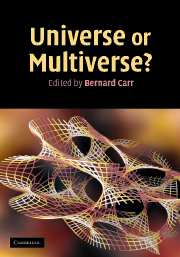Book contents
- Frontmatter
- Contents
- List of contributors
- Preface
- Acknowledgements
- Editorial note
- Part I Overviews
- Part II Cosmology and astrophysics
- Part III Particle physics and quantum theory
- Part IV More general philosophical issues
- 20 Scientific alternatives to the anthropic principle
- 21 Making predictions in a multiverse: conundrums, dangers, coincidences
- 22 Multiverses: description, uniqueness and testing
- 23 Predictions and tests of multiverse theories
- 24 Observation selection theory and cosmological fine-tuning
- 25 Are anthropic arguments, involving multiverses and beyond, legitimate?
- 26 The multiverse hypothesis: a theistic perspective
- 27 Living in a simulated universe
- 28 Universes galore: where will it all end?
- Index
- References
25 - Are anthropic arguments, involving multiverses and beyond, legitimate?
Published online by Cambridge University Press: 05 July 2014
- Frontmatter
- Contents
- List of contributors
- Preface
- Acknowledgements
- Editorial note
- Part I Overviews
- Part II Cosmology and astrophysics
- Part III Particle physics and quantum theory
- Part IV More general philosophical issues
- 20 Scientific alternatives to the anthropic principle
- 21 Making predictions in a multiverse: conundrums, dangers, coincidences
- 22 Multiverses: description, uniqueness and testing
- 23 Predictions and tests of multiverse theories
- 24 Observation selection theory and cosmological fine-tuning
- 25 Are anthropic arguments, involving multiverses and beyond, legitimate?
- 26 The multiverse hypothesis: a theistic perspective
- 27 Living in a simulated universe
- 28 Universes galore: where will it all end?
- Index
- References
Summary
Introduction
Though there has been much discussion of the Anthropic Principle (AP) over the last 35 years or so, it is still a very tantalizing and controversial subject, on the boundary between scientific cosmology and philosophy. As new scenarios and theories emerge for describing and explaining the origin of our observable universe, AP considerations inevitably surface. So, a critical review of the meaning and status of the AP — as well as of the directions anthropic arguments are now taking, their legitimacy and the fundamental philosophical issues involved — is perhaps warranted.
The anthropic idea was first introduced in 1961 by Robert Dicke, who noted the comparability of several very large numbers when fundamental physical constants are combined, and suggested that this might be connected with the conditions necessary for the presence of observers [1]. A decade later, Barry Collins and Stephen Hawking, realizing that the initial conditions for our universe seemed to be very special, suggested the following: ‘The fact that we have observed the universe to be isotropic is therefore only a consequence of our own existence’ [2]. One way of explaining this, they speculated, would be to have an ‘infinite set of universes with all possible initial conditions’ — thus anticipating the way many cosmologists now interpret the AP.
Information
- Type
- Chapter
- Information
- Universe or Multiverse? , pp. 445 - 458Publisher: Cambridge University PressPrint publication year: 2007
References
Accessibility standard: Unknown
Why this information is here
This section outlines the accessibility features of this content - including support for screen readers, full keyboard navigation and high-contrast display options. This may not be relevant for you.Accessibility Information
- 3
- Cited by
